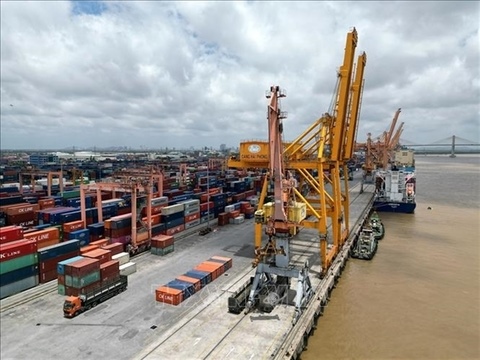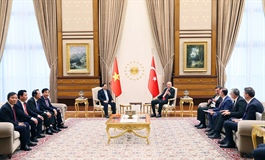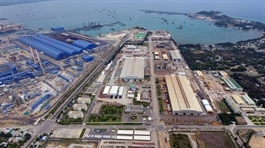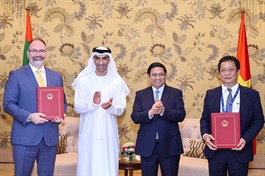Vietnamese firms should be cautious to avoid fraud in international trade
Vietnamese firms should be cautious to avoid fraud in international trade
Vietnamese firms should use additional caution to avoid increasingly sophisticated scams in international trade, Deputy Director of the Việt Nam Trade Promotion Agency Hoàn Minh Chiến said.

Containers at Hải Phòng Port. Careful negotiations for contract terms are important, especially deposit and payment methods to avoid scams in international trade. — VNA/VNS Photo Tuấn Anh |
The Ministry of Industry and Trade cited statistics that scams in the global market cost enterprises an estimated five per cent of revenue per year, with damages averaging US$1.7 million per case.
As most are small or medium size, Vietnamese enterprises face high risk of scams and disputes, while their experiences in avoiding and dealing with such cases are limited, he said. Many are not familiar with commercial dispute resolution forms such as arbitration and mediation.
Trần Thu Quỳnh, Trade Counsellor of Việt Nam in Canada, said that from the beginning of 2023, the Canadian market saw a rapid increase in the number of fraud cases, averaging 10 a month, mostly relating to requirements about non-existing certificates.
The global market is currently in difficulty, orders are dropping, forcing enterprises to increase search for orders. When getting an order, enterprises tended to be subjective and did not pay adequate attention to drafting contracts, Quỳnh said.
Fraudsters approached Vietnamese businesses by sending messages and emails for inquiries of large orders. When Vietnamese businesses asked for deposits, fraudsters require some certificates which do not exist and ask Vietnamese firms to pay a small sum for consultancy services to gain these certificates.
Vũ Chiến Thắng, Trade Counsellor of Việt Nam in Spain, said that the trade office provided support to domestic exporters in handling seven cases of fraud during the past three years, including cases related to cashew nut, black pepper, and iron.
The psychology of wanting to sell immediately leads to unfavourable negotiations and terms in contract, he said.
Thắng urged exporting firms to work with trade offices to verify their partners before signing contracts.
Careful negotiations for contract terms are important, especially deposit and payment methods, he said.
According to Dương Phương Thảo, Việt Nam's Trade Counsellor in Italy, frauds are diverse in forms and firms must be very cautious. Enterprises should consider using legal consulting services throughout the entire process rather than just approaching them when a dispute occurs.
Hoàng Thị Liên, Chairwoman of Việt Nam Pepper Association, said that notices and warnings of trade counsellors should be updated regularly on a unified, specific channel.
A set of reference rules on deposit levels and payment methods should be developed for enterprises to refer to when negotiating contracts.
Besides, commercial banks should provide support to domestic firms to ensure safety in international trade transactions, she said.
Chiến said the ministry would continue to provide market updates and early warnings to industry associations and enterprises about emerging forms of fraud in international trade.



























